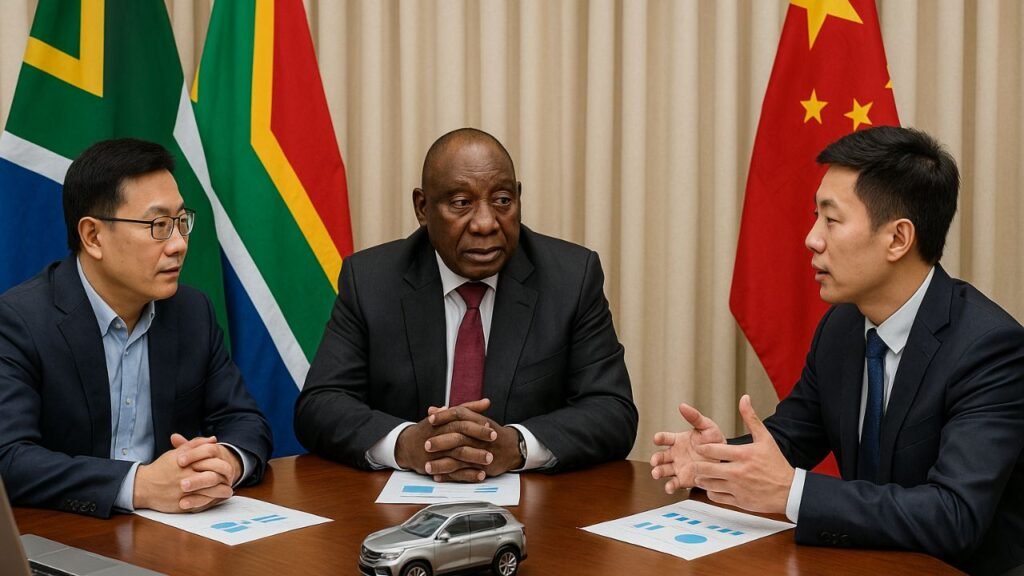South Africa in talks – South Africa is currently holding high-level discussions with Chinese automakers to strengthen its local automobile production sector. This move comes at a time when the South African economy is seeking to boost industrial growth, create new jobs, and enhance its manufacturing competitiveness in the global market. By partnering with established Chinese car manufacturers, the country aims to attract new investments, promote technology transfer, and improve the skills of its workforce. Such collaboration is expected to reduce South Africa’s reliance on imported vehicles while offering more affordable models for domestic buyers. Chinese automakers like BYD, Chery, and Great Wall Motors have already established a strong presence in other global markets, and their entry into South Africa could reshape the local automotive landscape. These talks align with South Africa’s industrial policy goals, focusing on expanding its automotive value chain, reducing unemployment, and positioning itself as a production hub for both domestic and export markets Reuters.

Chinese Automakers Eye African Market Expansion
Chinese automakers have been increasingly looking toward Africa as a strategic growth region, and South Africa is a natural choice due to its developed infrastructure, skilled labor force, and position as the continent’s most advanced automotive market. Companies such as Chery and GWM have already introduced models tailored to South African consumers, while electric vehicle leaders like BYD see South Africa as a potential base for EV adoption. According to reports, EV sales in Africa remain very low compared to Europe or China, but South Africa’s energy transition strategies may accelerate this demand Bloomberg. For Chinese automakers, local assembly or manufacturing plants in South Africa would not only cut tariffs and import costs but also build trust among local consumers. This expansion could also open the door for South Africa to become a key exporter of Chinese-designed vehicles to other African nations.
Boosting Local Production and Employment Opportunities
One of the most significant outcomes of these negotiations would be the strengthening of local production capacity. South Africa’s automotive sector already contributes nearly 5% to the country’s GDP and provides thousands of jobs, but experts believe this figure could grow with additional investment from Chinese manufacturers BusinessTech. Establishing plants and supply chain networks could create thousands of direct and indirect employment opportunities across regions, particularly in manufacturing hubs like Gauteng and KwaZulu-Natal. Moreover, local production could help stabilize vehicle prices for South African consumers by reducing dependence on fluctuating import costs. It would also contribute to skills transfer programs, as workers gain training from Chinese experts in modern assembly techniques, EV technologies, and hybrid system integration. This move would ultimately enhance South Africa’s global competitiveness in the auto industry.
Technology Transfer and Electric Vehicle Opportunities
Another key benefit from these talks is the potential for South Africa to accelerate its transition toward electric vehicles (EVs) and green technology. Chinese automakers like BYD and SAIC are world leaders in EV manufacturing, and their expertise could help South Africa fast-track its EV ecosystem Financial Times. With the government pushing policies for cleaner transport, such collaboration could lead to the setup of EV assembly plants, battery production facilities, and charging infrastructure projects. This not only helps reduce carbon emissions but also positions South Africa as a continental leader in green mobility solutions. Local universities and technical institutions may also partner with Chinese firms to launch research initiatives, creating a long-term knowledge base for sustainable auto production. The integration of EV technology would also prepare South Africa to meet future global export standards as more markets tighten their emissions regulations.
Challenges and Policy Considerations Ahead
Despite the promising opportunities, there are challenges that both South Africa and Chinese automakers must address to make this partnership sustainable. Policy alignment will be critical, as South Africa must balance its economic goals with protecting local industries and ensuring fair labor practices. Power shortages and high energy costs remain barriers for industrial expansion, and the success of EV adoption depends heavily on reliable electricity supply. Additionally, concerns about over-reliance on Chinese imports and competition with existing European and Japanese automakers could create tension in the local market Daily Maverick. South Africa will also need to ensure that environmental standards and sustainability goals are met as part of these agreements. If managed strategically, however, the collaboration could mark a turning point for South Africa’s auto industry, providing jobs, investment, and a pathway toward a more sustainable manufacturing future.






